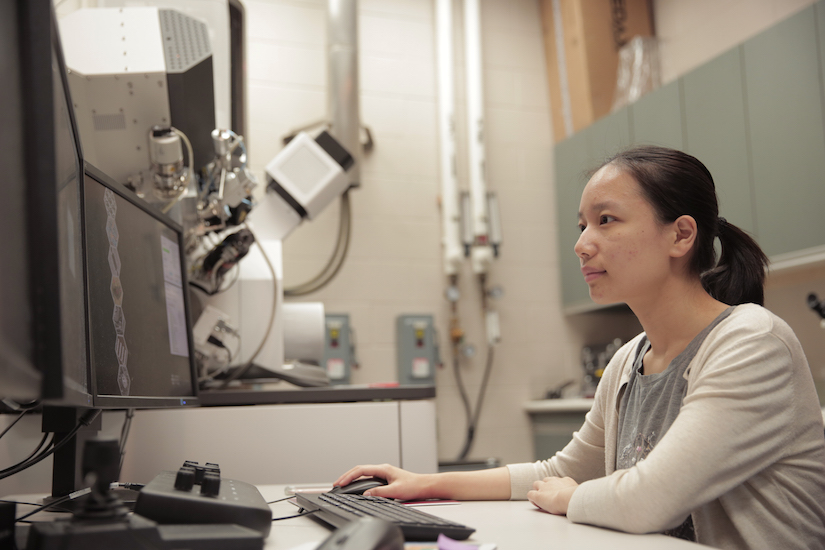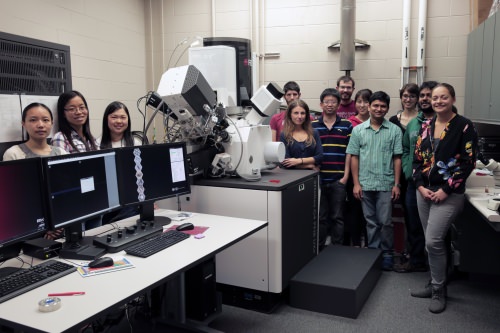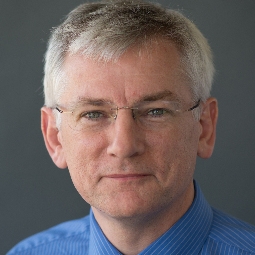Major NSF-sponsored materials research collaboration receives $15.6M grant

Chemical engineering Ph.D. student Yingxin Guan conducts research with a plasma focused ion beam microscope. Photo: Renee Meiller/UW-Madison College of Engineering
The University of Wisconsin–Madison center for research on materials like semiconductors, glass and liquid crystals will continue its work with $15.6 million in support from the National Science Foundation (NSF).
The grant provides six years of funding for the Materials Research Science and Engineering Center, based in UW–Madison’s College of Engineering and including 30 affiliated faculty from nine departments across the university.
Researchers at MRSEC, which was established in 1996, investigate fundamental, large-scale and complex questions in materials science.
“These questions require large groups comprised of researchers with skills in synthesis and characterization of materials, materials processing and in theory and computation,” says Nick Abbott, director of MRSEC and professor of chemical and biological engineering. “Only with these interdisciplinary groups can we go after problems that are really difficult and that involve fundamental questions in materials-related areas. If we can address them, they will lead to breakthroughs that will transform our understanding of materials and lead to a new slate of technologies. It’s high-risk, high-reward research.”
It’s the high-risk nature of the research that makes NSF’s broad and flexible funding commitment so important, Abbott says. MRSEC-affiliated faculty enjoy the flexibility to exhaustively pursue fundamental problems — a painstaking process that can often conclude without an elusive “eureka!” moment of discovery.
But NSF’s long-term commitment has also produced pioneering research: the use of liquid crystals for sensing, with applications in wearable technologies that detect airborne toxic gases; semiconductor synthesis from new materials, with broad implications for electronics; and the extremely efficient energy transfer capacity of carbon nanotubes. The property makes them a promising candidate for next-generation solar energy harvesting.
Another could come by way of better understanding glasses, a major thrust of MRSEC research. Most people understand glass as a brittle, transparent material useful for making windowpanes, storage containers and smartphone screens. But there are plastic and metal glasses, and MRSEC researchers may establish entirely new categories of glasses, according to chemistry Professor Mark Ediger, co-investigator with Paul Voyles, professor of materials science and engineering.

Graduate students from the MRSEC interdisciplinary research groups are pictured in the Materials Science Center with the plasma focused ion beam microscope. Photo: Renee Meiller/UW-Madison College of Engineering
“Our project seeks a fundamental understanding of glassy materials that enables the development of new glasses that might extend the life of machine tools or enable advances in quantum computing or lead to even better cell phone displays,” Ediger says.
MRSEC researchers led by chemical and biological engineering Professor Tom Kuech and materials science and engineering Professor Paul Evans hope to advance quantum information technologies, including quantum computing, by fabricating thin films from complex oxides.
The films often have unusual crystal structures exhibiting surprising electronic, magnetic and optical properties. Understanding them will only come about through sustained investment in fundamental research, the type of investment that NSF’s MRSEC funding provides.
“NSF support really goes a long way at UW–Madison and has a significant and broad impact,” Evans says. “And that impact is underpinned by the basic science happening at MRSEC. The basic scientific research provides the foundation for highly valuable education and outreach activities.”
MRSEC also supports internationally recognized educational and outreach programs, developing and distributing research-inspired educational kits and activities to teachers who incorporate basic materials science concepts in thousands of high school classrooms.
“It’s high-risk, high-reward research.”
Nick Abbott
Abbott says the new funding will help MRSEC transition from physical kits to developing digital educational materials in the form of educational games, which could reach millions of schoolchildren.
“The UW–Madison MRSEC has been a national leader in education for decades, with measureable impact worldwide,” says engineering physics Professor Wendy Crone, who co-leads MRSEC educational and outreach programs with Anne Lynn Gillian-Daniel, director of the Interdisciplinary Education Group. “We have created science kits, teaching laboratories, web-based content for K-12 teachers, museum exhibits, outreach activities and now digital games.”
MRSEC’s impact includes millions of dollars of scientific equipment available for use by industry and researchers both on and off the UW–Madison campus, according to Abbott, and the Advanced Materials Industrial Consortium — a group of companies that, together with MRSEC faculty and staff, provides invaluable professional development opportunities for UW–Madison students and researchers.
Tags: engineering, federal relations, grants, technology





